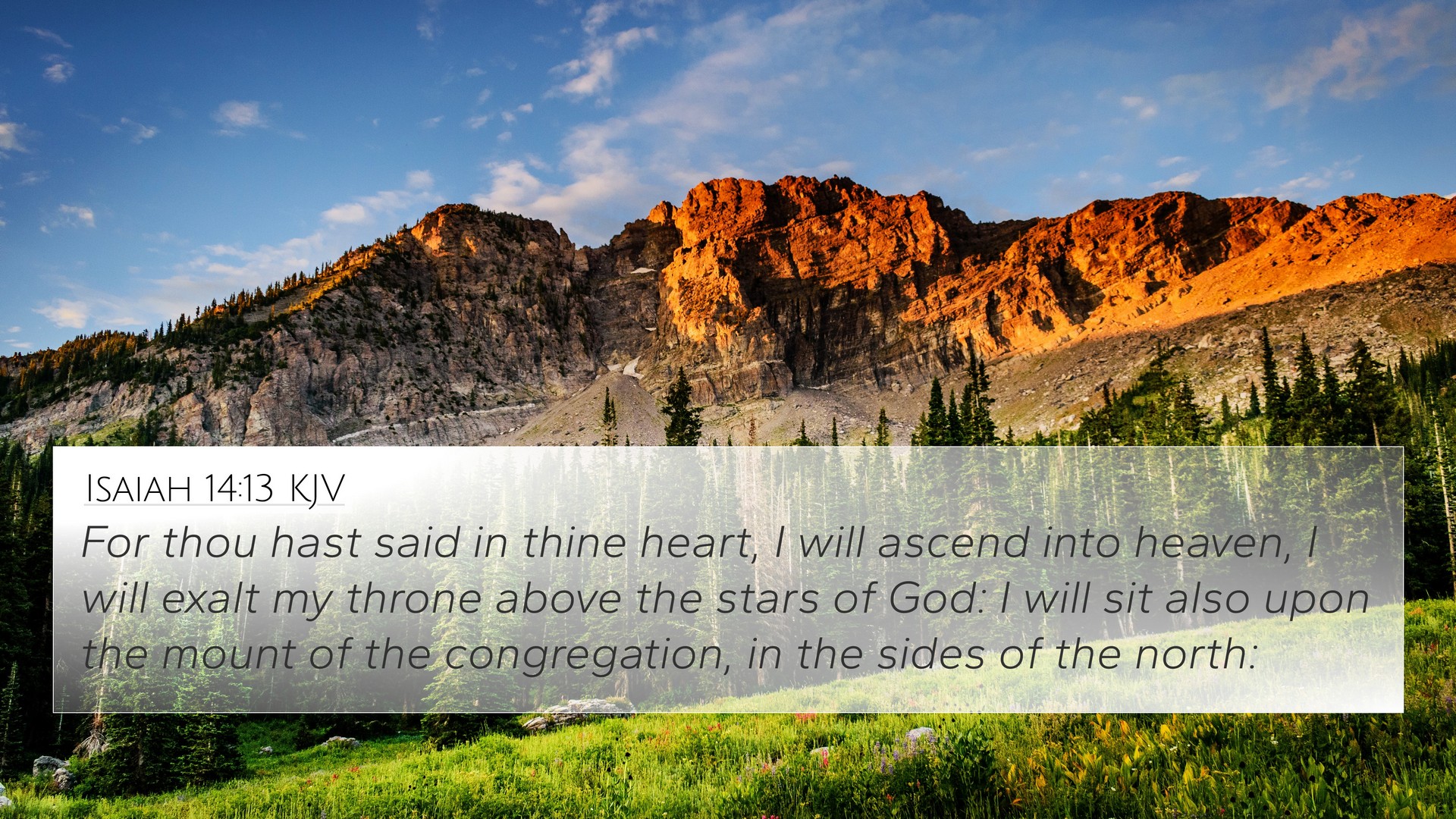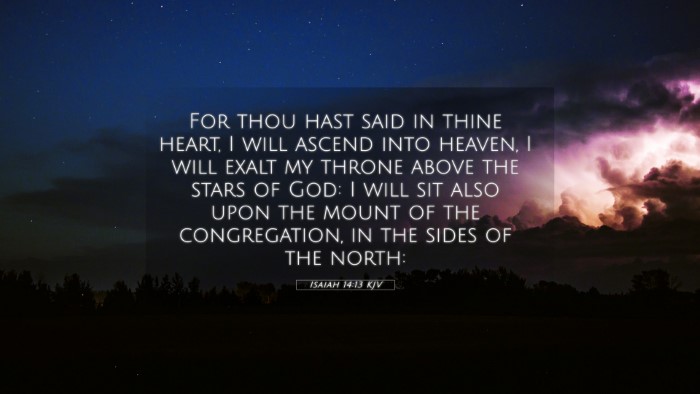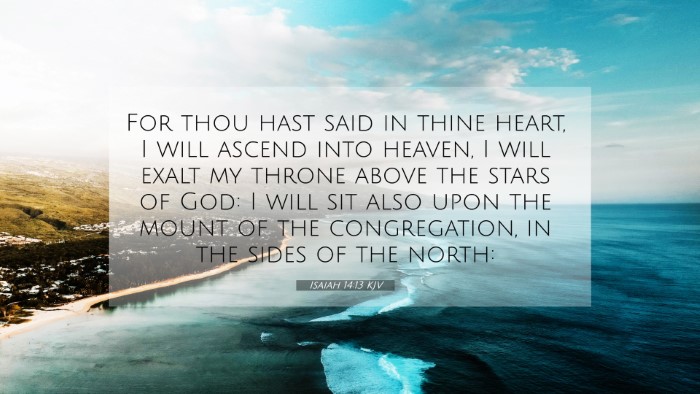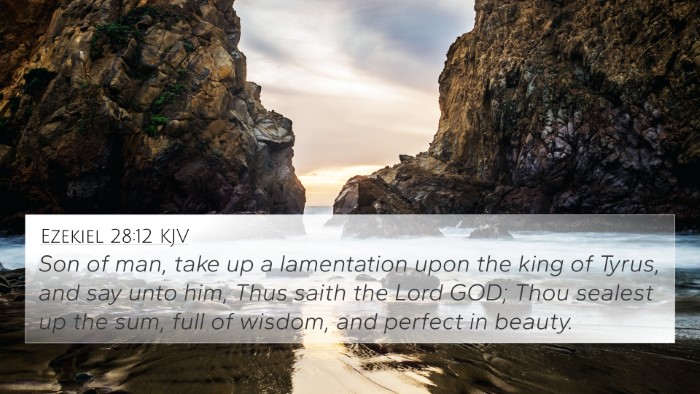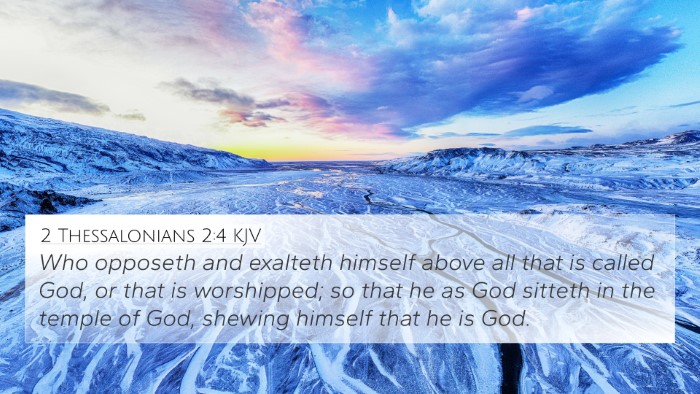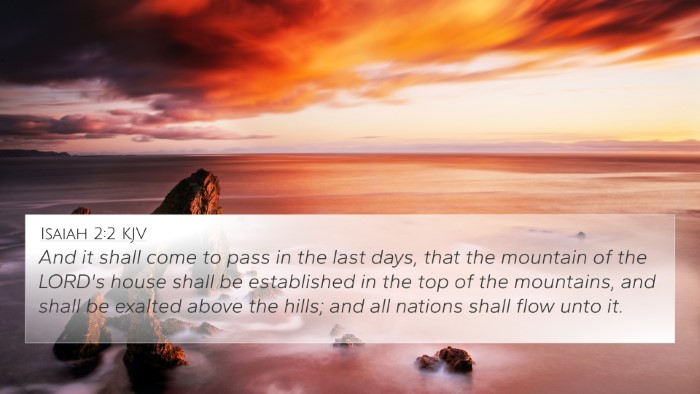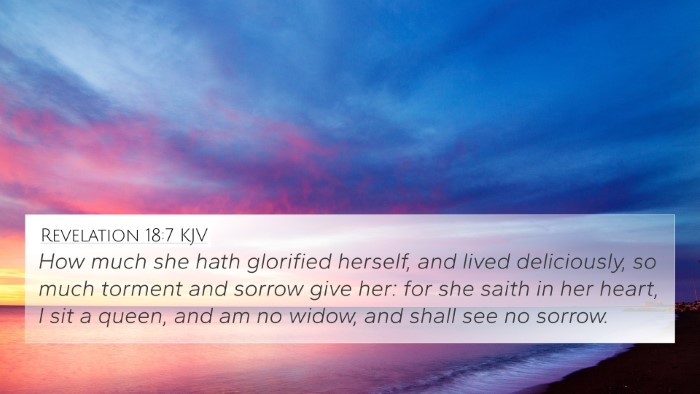Understanding Isaiah 14:13
Isaiah 14:13 states: "For you have said in your heart: 'I will ascend into heaven, I will exalt my throne above the stars of God; I will sit on the mount of the congregation on the farthest sides of the north;'" This verse is a part of the larger prophetic message against the king of Babylon, often seen as a representation of pride and rebellion against God.
Summary of Insights from Public Domain Commentaries
This verse has been interpreted through various lenses in public domain commentaries, yielding a rich understanding of its meaning:
- Matthew Henry: He emphasizes the arrogance of the king of Babylon, who aspired to exalt himself as high as God, illustrating the ultimate downfall that stems from such pride. Henry likens this ambition to that of Satan's, indicating a broader metaphor for rebellion against divine authority.
- Albert Barnes: Barnes highlights that this proclamation is rooted in the metaphorical aspirations of the enemy of God, reflecting the deep-seated desire to overthrow the divine order. He interlinks this ambition with a warning against human pride and ambition that seeks to challenge God's supremacy.
- Adam Clarke: Clarke details the historical context of the verse, pointing to the aspirations of the Babylonian ruler as a projection of human folly when one attempts to usurp the place of God. He interprets the mention of 'the mount of the congregation' as a profound statement concerning spiritual authority and divine sovereignty.
Key Themes and Connections
The verse reflects major themes of pride, rebellion, and the consequences of seeking supremacy over God. The underlying message serves as a critical reminder about the risks of hubris and the ultimate authority of divine power.
Bible Verse Cross-References
To deepen the understanding of Isaiah 14:13, the following verses highlight similar themes of rebellion and divine authority:
- Luke 10:18: "And He said to them, 'I saw Satan fall like lightning from heaven.'" This verse connects the aspirations of ascension and the subsequent fall due to pride.
- Ezekiel 28:17: "Your heart was lifted up because of your beauty; you corrupted your wisdom for the sake of your splendor." This verse parallels the prideful desires expressed in Isaiah 14:13.
- Proverbs 16:18: "Pride goes before destruction, and a haughty spirit before a fall." This famous proverb serves as a concise warning against the very attitude seen in Isaiah 14:13.
- Revelation 12:7-9: This passage depicts a cosmic battle and reflects the ultimate defeat of pride and rebellion against God, reinforcing themes from Isaiah.
- Philippians 2:9-11: Christ's exaltation after His humility reaffirms that true greatness comes through submission, contrasting the spirit of the Babylonian king.
- James 4:6: "But He gives more grace. Therefore it says, 'God opposes the proud, but gives grace to the humble.'" This verse highlights God's stance toward pride in a manner similar to Isaiah's message.
- Isaiah 2:12: "For the day of the Lord of hosts shall be upon everyone who is proud and lofty." This verse emphasizes God's judgment on pride, connecting closely with Isaiah 14:13.
Comparative Bible Verse Analysis
Both Old and New Testaments provide a rich tapestry of cross-references that echo the sentiments found in Isaiah 14:13. These connections encourage readers to examine the broader narrative of scripture, revealing a consistent warning against arrogance and a call for humility before God.
How to Use Bible Cross-References
Utilizing a Bible concordance or a Bible cross-reference guide can facilitate deeper insights. Tools for Bible cross-referencing help navigate thematic scriptures efficiently, enabling readers to explore how verse meanings interlink, enhance understanding, and solidify faith.
Inter-Biblical Dialogue
Exploring connections between Biblical texts can be defined as an inter-Biblical dialogue. This study extends to identifying connections between the Old and New Testament and understanding how themes such as pride and divine authority resonate throughout scripture.
Conclusion
Isaiah 14:13 serves as a poignant reminder of the consequences of pride and the pursuit of elevation above God. By examining this verse alongside related scripture through cross-referencing, believers can develop a deeper understanding of divine authority and the humility required in the face of such great power. Engaging with tools such as a Bible cross-reference system can enhance one’s study and sermon preparation, solidifying an understanding of core Biblical themes.
In conclusion, by reflecting on Isaiah 14:13 and its connections to other scriptures, one can appreciate the rich texture of the biblical narrative that continually emphasizes the supremacy of God over all human ambition.
